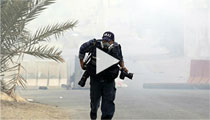President Almazbek Atambayev and his ministers declared their commitment to press freedom and rule of law even as government agencies routinely subjected independent reporters to intimidation. Kyrgyzstan resisted domestic and international calls for the release of Azimjon Askarov, an ethnic Uzbek investigative reporter and human rights defender serving a life term on fabricated charges, including the murder of a police officer during ethnic violence and inciting ethnic hatred. In a June special report, CPJ found that regional authorities targeted, tortured, and imprisoned Askarov in retaliation for his coverage of the June 2010 conflict between ethnic Uzbek and Kyrgyz residents in the south, along with his long record of in-depth reporting on abuses by regional police. The 2010 clashes continued to cast a shadow over Kyrgyzstan’s press freedom record. In February, the authorities blocked domestic access to the independent regional news website Ferghana News stemming from its reporting on the conflict. Uzbek-language media outlets, which were forced to close in the aftermath of the conflict, began to make their way back into the market, but in smaller numbers, local press freedom groups reported. As in previous years, independent journalists and news outlets battled politicized prosecutions and retaliatory lawsuits. Impunity continued in the 2007 murder of prominent editor Alisher Saipov and in the 2011 attack on his brother, journalist Shokhrukh Saipov.
Kyrgyzstan
» CPJ, UN officials, international groups seek release of reporter Azimjon Askarov.
» Journalists are subjected to routine government intimidation.
President Almazbek Atambayev and his ministers declared their commitment to press freedom and rule of law even as government agencies routinely subjected independent reporters to intimidation. Kyrgyzstan resisted domestic and international calls for the release of Azimjon Askarov, an ethnic Uzbek investigative reporter and human rights defender serving a life term on fabricated charges, including the murder of a police officer during ethnic violence and inciting ethnic hatred. In a June special report, CPJ found that regional authorities targeted, tortured, and imprisoned Askarov in retaliation for his coverage of the June 2010 conflict between ethnic Uzbek and Kyrgyz residents in the south, along with his long record of in-depth reporting on abuses by regional police. The 2010 clashes continued to cast a shadow over Kyrgyzstan’s press freedom record. In February, the authorities blocked domestic access to the independent regional news website Ferghana News stemming from its reporting on the conflict. Uzbek-language media outlets, which were forced to close in the aftermath of the conflict, began to make their way back into the market, but in smaller numbers, local press freedom groups reported. As in previous years, independent journalists and news outlets battled politicized prosecutions and retaliatory lawsuits. Impunity continued in the 2007 murder of prominent editor Alisher Saipov and in the 2011 attack on his brother, journalist Shokhrukh Saipov.
Five international rights groups and two senior U.N. officials--Special Rapporteur on Torture Juan E. Méndez and High Commissioner for Human Rights Navi Pillay--condemned Askarov's imprisonment and torture, and called for his immediate release. CPJ delegations pressed the case with Muktar Djumaliyev, the country's ambassador to the United States, in June and with Kyrgyz Parliament Speaker Asilbek Jeenbekov in September.
June 2010: | Human Rights Watch calls on Kyrgyzstan to release Askarov. |
September 2010: | CPJ sends a protest letter to then-President Roza Otunbayeva urging Askarov's release. |
November 2011: | Frontline Defenders urge Otunbayeva to ensure a fair trial for Askarov. |
December 2011: | Freedom House demands Askarov's release. |
July 2012: | Open Society Institute calls on the European Union to address Askarov's case. |
November 2012: | CPJ honors Askarov with its International Press Freedom Award. |
December 2012: | On December 10, International Human Rights Day, CPJ sends President Almazbek Atambayev a petition containing more than 5,000 signatures from individuals around the world calling for Askarov's release. |
Government officials and security service agents subjected several independent journalists and news outlets to retaliatory intimidation, threats, and politicized prosecution. The anti-press attacks occurred at the same time Kyrgyz authorities publicly urged reporters to expose corruption in government.
February 2012: | The authorities order domestic Internet service providers to block access to Ferghana News. |
June 2012: | Grigory Bubel, former head of Kyrgyzstan's prison system, seeks 50 million som (about US$1 million) from the paper Dengi & Vlast (Money & Power) concerning coverage of alleged mishandling of deceased prisoners' remains. |
June 2012: | The state security service demands the local agency K-News stop reporting on the arrest of a former Bishkek mayor. |
July 2012: | Blogger Vladimir Farafonov is fined 50,000 som (about US$1,000) for alleged extremism in connection with his reporting on the spread of nationalism in the media. |
August 2012: | Security officers threaten independent journalist Shokhrukh Saipov. |
September 2012: | The national police academy seeks defamation damages from the paper Delo Nomer stemming from an article describing a scuffle among intoxicated academy graduates. |
Two independent and two state-owned Uzbek-language outlets began covering news in southern Kyrgyzstan, which is heavily populated by ethnic Uzbeks, local journalists told CPJ. The development, while encouraging, hardly made up for Uzbek media losses following the June 2010 ethnic conflict. Uzbek media owners were forced to close or sell off the properties after the violence.
The authorities failed to identify the masterminds in the 2007 slaying of Alisher Saipov, editor of the independent newspaper Siyosat, Saipov's family told CPJ. In April, Kyrgyzstan's Supreme Court ordered a lower court to re-open the murder case. The order came after exculpatory evidence was introduced on behalf of Abdufarit Rasulov, who had been jailed in 2010 on accusations of carrying out the murder.
March 2009: | A brutal assault on journalist Syrgak Abdyldayev |
November 2009: | A vicious attack on independent reporter Kubanychbek Zholdoshev |
June 2010: | The beating and abuse of journalist Azimjon Askarov |
August 2011: | The beating of journalist Shokhrukh Saipov |

